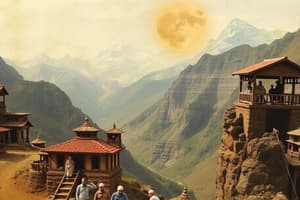Podcast
Questions and Answers
What is the cultural significance of Mount Kailash in Hinduism?
What is the cultural significance of Mount Kailash in Hinduism?
- It is known for its rich agricultural practices.
- It is a famous tourist attraction for mountaineers.
- It serves as a sacred pilgrimage destination. (correct)
- It symbolizes the harmony of nature.
Which of the following best describes the mythological importance of the Himalayas?
Which of the following best describes the mythological importance of the Himalayas?
- They mostly serve as recreation locations for tourists.
- They are often personified as the abode of gods. (correct)
- They are primarily viewed as legitimate economic zones.
- They are known for being large agricultural fields.
How do local festivals reflect the cultural practices related to the Himalayas?
How do local festivals reflect the cultural practices related to the Himalayas?
- They celebrate the significance of the mountains in local beliefs. (correct)
- They focus solely on modern entertainment.
- They commemorate historical events unrelated to nature.
- They encourage migration to urban areas.
What role do traditional knowledge and practices play in the cultural significance of the Himalayas?
What role do traditional knowledge and practices play in the cultural significance of the Himalayas?
What challenge is posed to cultural preservation in the Himalayan region?
What challenge is posed to cultural preservation in the Himalayan region?
Flashcards are hidden until you start studying
Study Notes
Cultural Significance of the Himalaya
-
Spiritual Center
- Home to important religious sites for Hinduism, Buddhism, and Jainism.
- Mount Kailash is a sacred pilgrimage destination for Hindus.
- Lhasa, in Tibet, is central to Tibetan Buddhism.
-
Mythological Importance
- Featured in many ancient texts, including the Vedas and Puranas.
- Often personified as the abode of gods and a place of divine revelations.
-
Cultural Practices
- Local festivals often celebrate the mountains and their significance in the beliefs of communities.
- Rituals and ceremonies incorporate mountain elements and respect for the natural world.
-
Art and Literature
- Influence on poetry, painting, and music throughout history.
- Symbol of beauty and spirituality in various art forms.
-
Traditional Knowledge and Practices
- Indigenous communities have rich traditions and knowledge systems related to the Himalayas.
- Practices include sustainable agriculture and herbal medicine learned from the mountain ecosystem.
-
Tourism and Heritage
- The Himalayas attract pilgrims, trekkers, and tourists seeking natural beauty and spiritual experiences.
- Local cultures benefit economically while facing challenges of globalization.
-
Challenges to Cultural Preservation
- Modernization and environmental degradation threaten traditional practices and lifestyles.
- Migration of youth to urban areas leads to cultural dilution.
Cultural Significance of the Himalayas
- The Himalayas are a spiritual center for Hinduism, Buddhism, and Jainism.
- Mount Kailash is a sacred pilgrimage site for Hindus.
- Lhasa, Tibet, is a central location for Tibetan Buddhism.
- The Himalayas are featured in ancient texts like the Vedas and Puranas, often depicted as the abode of gods.
- Local festivals celebrate the mountains and their significance in local belief systems.
- Local rituals and ceremonies respect the natural world and incorporate mountain elements.
- The Himalayas have influenced poetry, painting, and music throughout history.
- The mountains are often a symbol of beauty and spirituality in art.
- Indigenous communities possess rich traditions and knowledge systems related to the Himalayas.
- Sustainable agriculture and herbal medicine practiced by local communities come from the mountain ecosystem.
- Tourism and pilgrimage in the Himalayas bring economic benefit to local cultures, while also presenting challenges from globalization.
- Modernization and environmental degradation threaten traditional practices and lifestyles.
- The migration of younger generations to urban areas leads to cultural dilution.
Studying That Suits You
Use AI to generate personalized quizzes and flashcards to suit your learning preferences.




